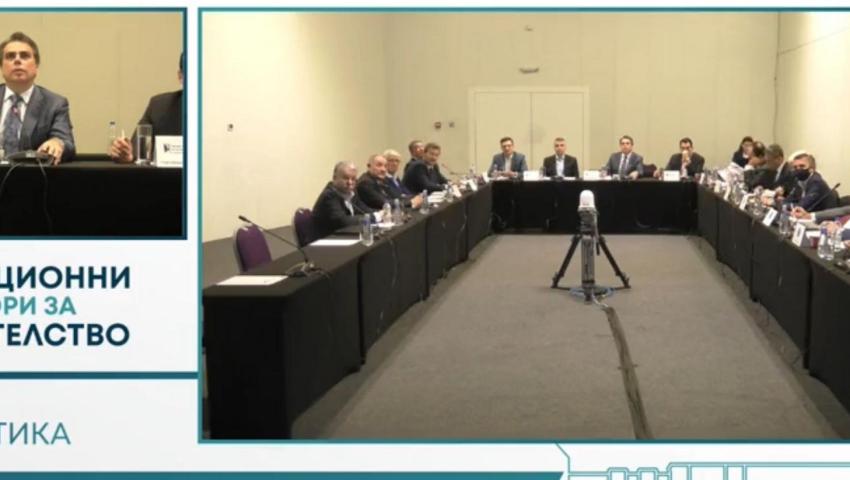Nuclear energy has proved a problem in the parties' negotiations to form a government
The support for the business continues due to the high prices, the model according to which the liberalization in our country is going will change. Maritza East mines will work as long as possible

Shot: Facebook profile of "We continue to change"
The four political parties - "We continue the Change" / PP /, "BSP for Bulgaria", "There is such a people" / ITN / and "Democratic Bulgaria" / DB / have reached a partial agreement on the energy policies they intend to pursue. This became clear during the first round of negotiations on a coalition agreement and potential governance of the country.
One of the points on which the parties have united is, if there is an increase in electricity prices, to expand the scope and size of the existing energy aid scheme. This should become a fact in January. During the talks, however, businesses demanded an increase in state aid because prices reached record levels, both in Bulgaria and in the region.
The other point on which there is agreement is the possibility to have a settled account on an annual basis and suspension of deliveries after a second unpaid monthly bill. However, heating bills remain outside this range. There is a possibility for equal monthly installments. However, it is not clear whether the energy companies have the financial resources to support consumers with 11 equal monthly installments and the 12th equalization.
The central budget will support the payment of the bills of state and social institutions, but only what they cannot pay from their budgets. This is due to the increase in wholesale electricity prices. Possibilities for returning budget organizations to the regulated electricity market will also be explored. It was also agreed to change the rules of trading on the energy exchange and to promote long-term contracts. There are different options for compensating businesses for higher electricity prices. It seems that the business support scheme will also change.
Most of the participants in the discussion agree that there is a tax on excess profits.
All parties agree to audit state energy companies and, if there are irregularities, to identify them and give them to the competent authorities.
An official definition of "energy poverty" will be developed. This will be done by the Ministry of Social Affairs. Talks on the subject have stalled because the issue was discussed in the economy panel, which is being pursued in parallel by "Continuing Change".
Overcoming energy poverty and completing the interconnector with Greece
The parties agree on a plan to overcome energy poverty and to complete the construction of the interconnector with Greece in 2022.
A review of the contractual relations for the purchase of natural gas will be made in order to achieve diversification of sources, the lowest price and flexibility. This will be done regularly at the expert level. There will be a six-month review of contracts.
The CPC will have a new staff, changes in the financing of the rehabilitation
The Commission for Protection of Competition will investigate the cartels, but the composition will be changed and the expert potential of the commission will be increased.
A reform will be carried out on how to finance energy efficiency projects.
We continue the change party is of the opinion that Bulgaria should remain a nuclear state. This is an element of national security, regardless of energy security. From this point of view, when the reactors in Kozloduy will be decommissioned, there is no way for Bulgaria to be left without nuclear power. Thus, the party firmly defended its position that our country should not be left without nuclear energy. The other question is to what extent the life of existing reactors and the economic feasibility of new capacity can be extended before the current reactors are decommissioned. The PP believes that the best and cheapest place is Kozloduy, but for this purpose an expert analysis will be made.
For nearly an hour, experts discussed how to analyze a new nuclear power plant
It took the parties about an hour to discuss exactly how to formulate the idea of an analysis of the needs for a new nuclear power plant, where, how and why to build it. The strongest opponents of the nuclear future turned out to be from the Yes Bulgaria party, which are not convinced that after 2050 we will need nuclear power. In the end, everyone agreed that it would be written that an independent preliminary expert analysis would be made, which would be public and based on the lowest cost and time for construction.
"We continue the change" announced that they want a more detailed analysis for the construction of flow hydropower plants on the Danube.
The Maritza East complex will be preserved and negotiations will be held with the EU to maximize the life of its energy facilities. In the next six months, a list of alternative projects for the preservation of Maritza East as an energy complex will be developed. This is a requirement of Europe for the presentation of projects under the Modernization Fund, as well as for the readiness of projects for the EC plan "Ready for 55".
There will also be changes in the financing models for energy efficiency projects, but details will be given at a later stage.
All points on which agreement is reached will be specified, and those on which no agreement has been reached will be discussed once again. Separately, the more controversial issues will be discussed by the party leaders.
